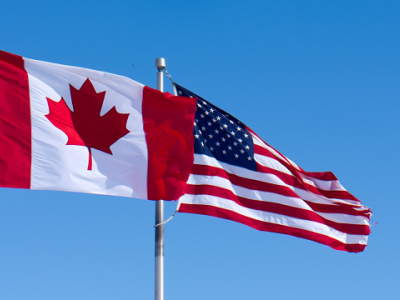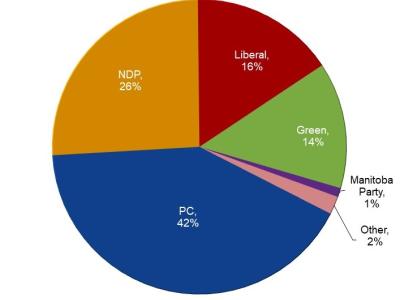The latest Probe Research survey of federal voting intentions for the Winnipeg Free Press shows that Pierre Poilievre and the federal Conservatives continue to gain ground in Manitoba, claiming the potential votes of exactly one-half of decided and leaning Manitoba voters.
Today, 50 per cent of Manitobans would cast ballots for a federal Conservative candidate in their riding, up slightly from 47 per cent in March. One-quarter prefer Jagmeet Singh and the NDP (24%, -2% province-wide since March), while only one in five prefer Justin Trudeau and the federal Liberals (21%, -2% vs. March). The Green Party remains at two per cent – the same level they captured in the last federal election – while support for Maxime Bernier and the People’s Party of Canada (PPC) increased slightly since March (3%, +2%) but remains slightly lower than the seven per cent the party received in the 2021 federal election.
Overall, 11 per cent of Manitobans are undecided about who to vote for in the next federal election.
The Conservatives gained slightly in both Winnipeg and rural Manitoba, with Liberal support eroding in both regions and NDP support holding relatively steady. The Liberals are slightly more competitive in some parts of suburban Winnipeg, but the Conservatives hold a significant lead in these areas.
Pierre Poilievre and the Conservatives are buoyed by a three-to-one advantage over both the Liberals and NDP among male voters (61% vs. 16% NDP and 17% Liberal). The Tories also hold a slight lead over the NDP among women (38% vs. 32%). Conservative support among those aged 18-34 has increased eight points since March, with the party now holding a comfortable lead among all age groups and in most demographic categories.
A vote retention analysis shows that the Liberal vote in Manitoba has collapsed significantly during the past three years. Fewer than one-half of those who cast a ballot for the Liberals in 2021 plan to do so again in the next federal election. One-quarter of these former Liberal voters have migrated to the NDP, with slightly more than one in ten now planning to vote Conservative.
The NDP has retained about three-quarters of its 2021 vote share, but one in ten have moved to the Conservatives.
The Story
With the federal NDP no longer supporting the Liberal government through a supply and confidence agreement in the House of Commons, there is a strong possibility of a federal election in early 2025 – or perhaps even later this year.
If an election happens, the Conservatives could pick up at least one or two suburban Winnipeg ridings from the Liberals. Although the NDP successfully defended Elmwood-Transcona in a byelection this month, the Conservatives are in a strong position to pick up seats in the city’s inner and outer suburbs. The focus will now shift to how many gains the Conservatives can make in these areas, particularly in south Winnipeg, where ridings like Winnipeg South, Winnipeg South Centre and St. Boniface-St. Vital are in play.
About the Probe Research Omnibus
For more than two decades, Probe Research has undertaken quarterly omnibus surveys of random and representative samples of Manitoba adults. These scientific telephone surveys have provided strategic and proprietary insights to hundreds of public, private and not-for-profit clients on a range of social, cultural and public policy topics. The Probe Research Omnibus Survey is the province’s largest and most trusted general population survey.
Disclosure Statement
Probe Research is a member of the Canadian Research Insights Council (CRIC) and confirms that this research fully complies with all CRIC Standards including the CRIC Public Opinion Research Standards and Disclosure Requirements. Learn more at: https://www.canadianresearchinsightscouncil.ca/standards/por/
Methodology
Probe Research surveyed a random and representative sampling of 1,000 adults residing in Manitoba between September 5th and 15th, 2024.
With a sample of 1,000, one can say with 95 per cent certainty that the results are within ± 3.1 percentage points of what they would have been if the entire adult population of Manitoba had been surveyed. The margin of error is higher within each of the survey’s population sub-groups.
The sample consists of 465 Manitobans randomly recruited via live-agent operator, 311 randomly recruited via Interactive Voice Response (IVR) and 224 members of Probe Research’s online panel. All respondents completed the survey on an online platform.
Modified random digit dialing, including both landline and wireless numbers, ensured all Manitoba adults had an equal opportunity to participate in this Probe Research survey.
Minor statistical weighting has been applied to this sample so that age, gender and regional characteristics properly reflect the province’s population.




